Living with chronic migraines can feel like navigating a relentless storm, where every flash of light and rumble of thunder threatens to disrupt your day. While migraines can stem from various factors like stress, hormonal shifts, and environmental stimuli, one often-overlooked culprit is food. In this comprehensive guide, we’ll delve into the intricate connection between chronic migraines and their triggers, along with exploring nutritional tips and lifestyle modifications that may offer relief.
Unraveling the Mystery of Food Triggers:
For many migraine sufferers, certain foods and beverages can act as triggers, igniting debilitating headaches and accompanying symptoms. Common culprits include:
- Tyramine-Rich Foods: Aged cheeses, cured meats, and fermented foods.
- Histamine-Containing Foods: Aged cheeses, alcohol, and fermented foods.
- Caffeine: Excessive consumption or sudden withdrawal.
- Artificial Sweeteners: Aspartame and other additives.
- MSG (Monosodium Glutamate): Found in processed foods, soups, and Asian cuisine.
Nutritional Tips for Migraine Management:
Beyond identifying and eliminating trigger foods, adopting a migraine-friendly diet rich in nutrient-dense foods can significantly aid symptom management. Here’s how:
- Focus on Whole Foods: Opt for unprocessed options like fruits, vegetables, lean proteins, and whole grains to provide essential nutrients and antioxidants.
- Stay Hydrated: Aim for at least eight glasses of water daily, and incorporate hydrating foods like watermelon and cucumber into your diet.
- Balance Blood Sugar: Eat regular, balanced meals and snacks to maintain stable blood sugar levels.
- Mindful Eating: Pay attention to how certain foods make you feel and keep a food diary to track potential triggers.
- Consider Supplements: Consult with a healthcare provider about supplements like magnesium, riboflavin (vitamin B2), and coenzyme Q10, which may reduce migraine frequency and severity.
Lifestyle Modifications for Migraine Management:
Incorporating lifestyle changes alongside dietary adjustments can further support migraine management and overall well-being. Here are some key strategies:
- Manage Stress: Prioritize stress-reducing activities such as meditation, yoga, and deep breathing exercises.
- Prioritize Sleep: Aim for seven to eight hours of quality sleep each night and establish a consistent sleep schedule.
- Regular Exercise: Engage in light cardiovascular exercises like walking or cycling for at least 30 minutes, 3-4 times a week.
- Maintain Good Posture: Be mindful of your posture, especially when using electronic devices, and take breaks to prevent muscle tension.
- Consistency is Key: Implement dietary and lifestyle changes consistently for optimal results.
Finding Relief with Natural Remedies:
In addition to dietary and lifestyle modifications, certain natural remedies may offer relief from migraine symptoms. Consider:
-
Peppercorns:
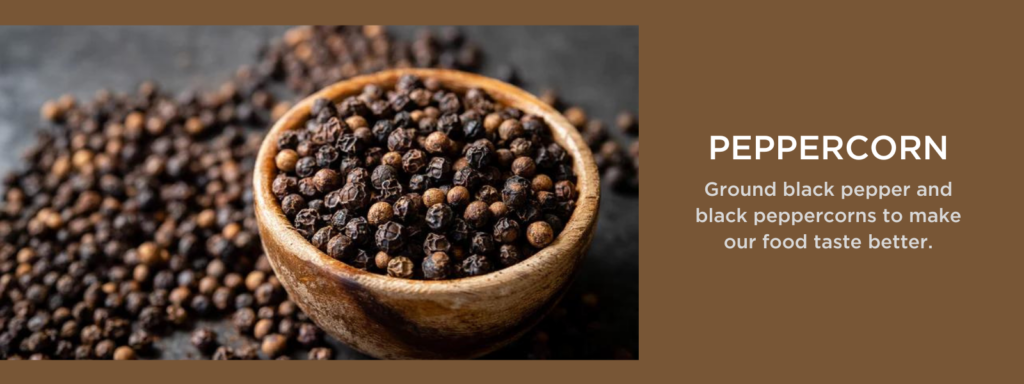 Soaking 4-5 peppercorns overnight and consuming them on an empty stomach in the morning is a simple yet effective remedy for migraine relief. Peppercorns contain piperine, a compound known for its anti-inflammatory properties, which may help alleviate migraine symptoms. Additionally, peppercorns stimulate digestion, aiding in the absorption of nutrients essential for overall health.
Soaking 4-5 peppercorns overnight and consuming them on an empty stomach in the morning is a simple yet effective remedy for migraine relief. Peppercorns contain piperine, a compound known for its anti-inflammatory properties, which may help alleviate migraine symptoms. Additionally, peppercorns stimulate digestion, aiding in the absorption of nutrients essential for overall health. -
Tulsi Leaves:
-
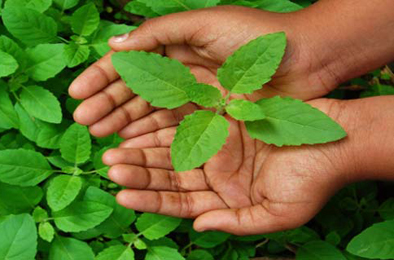 Consuming 8-10 tulsi (holy basil) leaves daily can relieve migraines. Tulsi is revered in Ayurveda for its medicinal properties, including its ability to reduce inflammation and alleviate stress. Regular consumption of tulsi leaves may help calm the nervous system and prevent migraine attacks.
Consuming 8-10 tulsi (holy basil) leaves daily can relieve migraines. Tulsi is revered in Ayurveda for its medicinal properties, including its ability to reduce inflammation and alleviate stress. Regular consumption of tulsi leaves may help calm the nervous system and prevent migraine attacks. -
Chamomile Tea:
-
 Chamomile tea boasts anti-inflammatory, anti-spasmodic, and soothing properties that make it a valuable ally in the fight against migraines. Regularly drinking 1-2 cups of chamomile tea can help relax tense muscles, ease tension headaches, and promote overall relaxation. Additionally, chamomile’s mild sedative effects may aid in improving sleep quality, a crucial factor in migraine management.
Chamomile tea boasts anti-inflammatory, anti-spasmodic, and soothing properties that make it a valuable ally in the fight against migraines. Regularly drinking 1-2 cups of chamomile tea can help relax tense muscles, ease tension headaches, and promote overall relaxation. Additionally, chamomile’s mild sedative effects may aid in improving sleep quality, a crucial factor in migraine management. -
Cayenne Pepper:
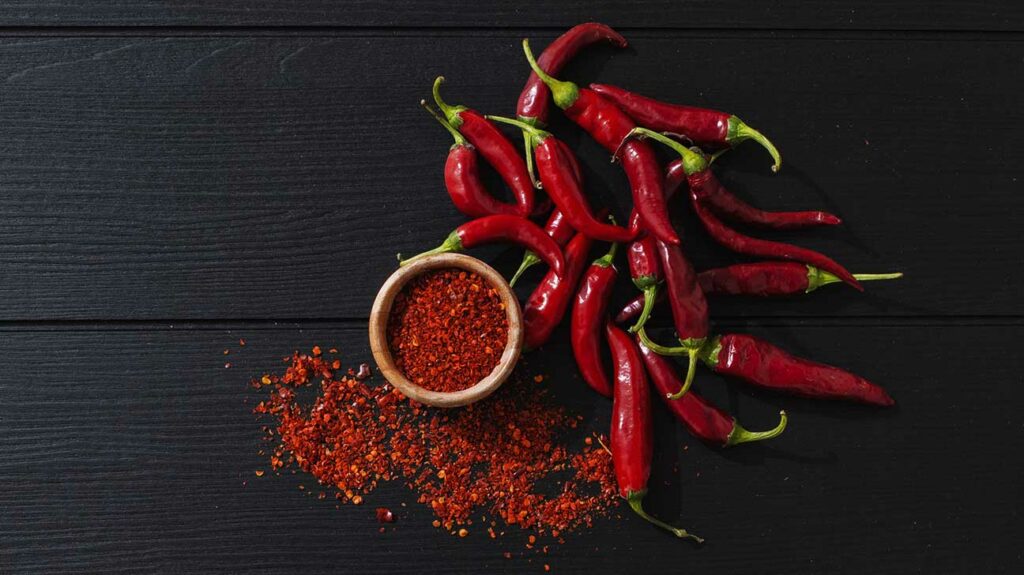 Cayenne pepper contains capsaicin, a compound known for its pain-relieving properties. Mixing 1/4th teaspoon of cayenne pepper with a cup of plain or lemon water and consuming it can stimulate blood circulation and improve blood flow, thereby alleviating migraine pain. Additionally, cayenne pepper’s ability to desensitize nerve endings may help reduce the intensity of migraine attacks.
Cayenne pepper contains capsaicin, a compound known for its pain-relieving properties. Mixing 1/4th teaspoon of cayenne pepper with a cup of plain or lemon water and consuming it can stimulate blood circulation and improve blood flow, thereby alleviating migraine pain. Additionally, cayenne pepper’s ability to desensitize nerve endings may help reduce the intensity of migraine attacks.
-
Ginger:
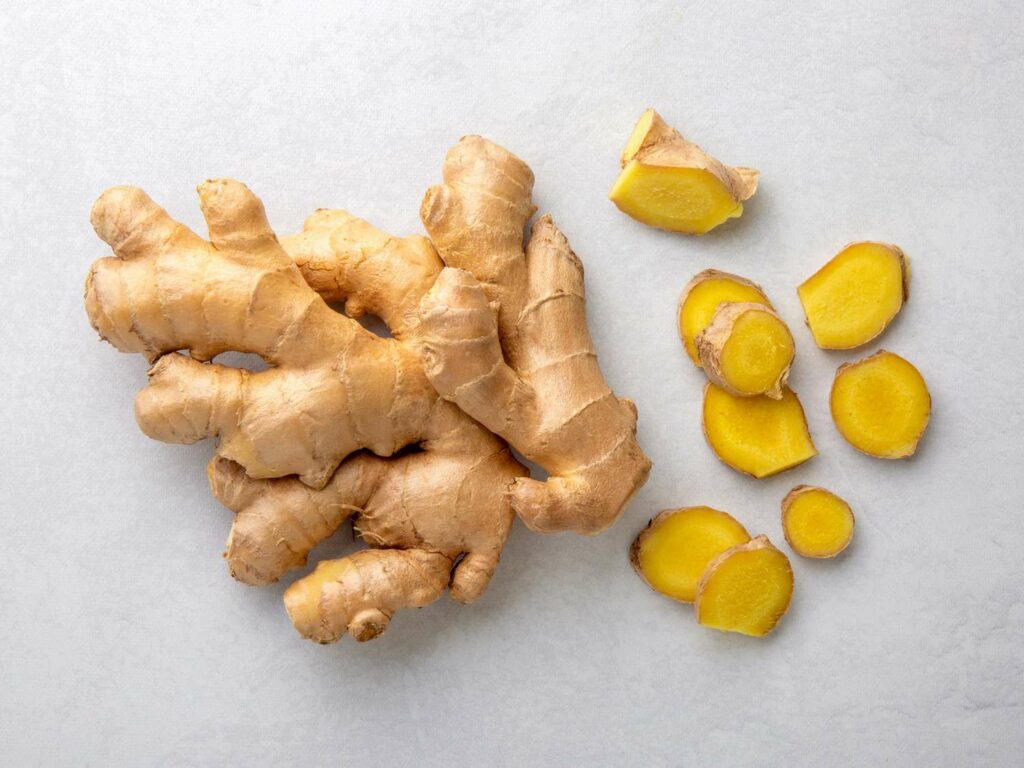 Ginger is a potent anti-inflammatory agent that can help alleviate migraine pain by blocking the production of prostaglandins, compounds that promote inflammation and pain in the brain’s blood vessels. Chewing on a sliced piece of ginger or drinking ginger tea can provide relief from migraine symptoms and may even help prevent future attacks. Ginger’s digestive properties also aid in soothing gastrointestinal issues that may exacerbate migraines.
Ginger is a potent anti-inflammatory agent that can help alleviate migraine pain by blocking the production of prostaglandins, compounds that promote inflammation and pain in the brain’s blood vessels. Chewing on a sliced piece of ginger or drinking ginger tea can provide relief from migraine symptoms and may even help prevent future attacks. Ginger’s digestive properties also aid in soothing gastrointestinal issues that may exacerbate migraines. -
Pineapple and Papaya:
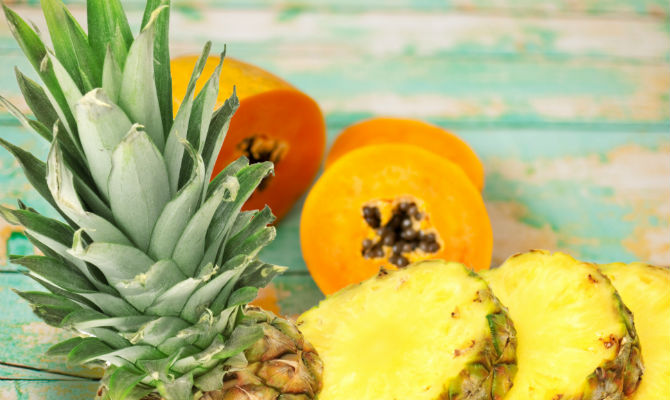 Fruits like pineapple and papaya contain enzymes such as bromelain and papain, respectively, which possess anti-inflammatory properties and aid in digestion. Consuming these fruits regularly can help alleviate gastrointestinal issues like acidity, bloating, and indigestion, which are common triggers for migraines. Additionally, the anti-inflammatory effects of bromelain and papain may help reduce inflammation in the body, thereby providing relief from migraine pain.
Fruits like pineapple and papaya contain enzymes such as bromelain and papain, respectively, which possess anti-inflammatory properties and aid in digestion. Consuming these fruits regularly can help alleviate gastrointestinal issues like acidity, bloating, and indigestion, which are common triggers for migraines. Additionally, the anti-inflammatory effects of bromelain and papain may help reduce inflammation in the body, thereby providing relief from migraine pain.
By incorporating these natural remedies into your daily routine, you can harness the power of nature to manage migraine symptoms effectively. However, it’s essential to remember that individual responses to these remedies may vary, and consulting with a healthcare professional is recommended before making any significant changes to your diet or lifestyle. With patience and persistence, relief from chronic migraines is within reach, allowing you to reclaim control over your health and well-being


